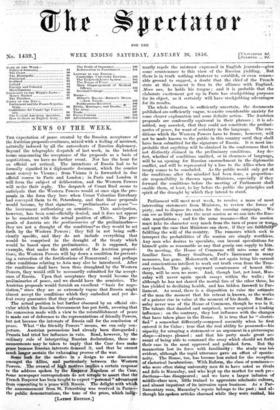NEWS OF THE WEEK.
TIER expectation of peace created by the Russian acceptance of the Austrian proposals continues, mixed with a feeling of mistrust, naturally induced by all the antecedents of Russian diplomacy. Beyond the telegraphic despatch of last week, in the briefest terms annmincing the acceptance of the proposals as a basis of negotiations, -we have no further event. Nor has the hour for an officiel act arrived. The intentions of Russia had to -be formally signified in ii diplomatic document, iihich the courier must convey to Vienna from-Vienna it is forwarded in due official "Course "'to -Paris and London ; in Paris and -London it will form the subject of deliberation, and the Western Powers will make their reply. The despatch of Count Buol seems to anticipafe that the Western Powers would at once sign the pro- posals in the form they bore when Count Valentine Esterhazy had conveyed them to' St. Petersburg, and that those proposals would become, by that signature, "preliminaries of peace "- the instrument authorizing an armistice. This anticipation, however, has been semi-officially denied, and it does not appear to be consistent with the actual position of affairs. The pro- posals of Austria are the preliminaries of the preliminaries— they are not a draught of the conditions as they would be set forth by the Western .Powers ; they fail in not being suffi- ciently specific, and they do not include everything that would- be 'comprised in the draught of the treaty -which would be based upon the preliminaries. It is supposed, for example that under the fifth article of the Austrian proposi- tions, the Western Powers will lay down a condition for prevent- ing a reereetion of the fortifications of Bomarsund ; and perhaps ether conditions relating to Asia may also be introduced. After the conditions shall have been thus draug,hted by the Western Powers they would still be necessarily submitted for the accept- ance of Russia. Upon that acceptance they would become the preliminaries of peace, and we should have the armistice. The Austrian proposals would furnish an excellent "basis for nego- tiation," since' they are so extremely Vague that Russia might almost accept the conditions which they, embodied and yet de- feat every guarantee that they advance.
The actual position is but further obscured by an official cir- cular which the Russian Government has put forth, avowing that the concession made with a view to the reestablishment of peace is made out of deference to the representations of friendly Powers, but not because the interests of Russia call for the conclusion of peace. 'What "the friendly Powers" means, we can only con- jecture. Austrian persuasions had already been disregarded ; Prussia had tried her influence in vain. Read, however, by the ordinary rule of interpreting Russian declarations, these an- nouncements may be taken to imply that the Czar does make peace because Russian interests demand it, and that he cannot much longer sustain the exhausting process of the war.
Some look for the motive in a design to sow dissension amongst the Allies, and particularly between the Western Powers. The avowal of high motives implies a certain response to the address spoken by the Emperor Napoleon at the Czar. Some newspaper correspondents do not scruple to assert that the French Emperor has been taught to expect " personal " advantages from consenting to a peace with Russia. The delight with whioh the announcement from St. PetersbUrg was received in Paris— the public demonstrations, the tone of the press, which indig- hantly repels the mistrust expressed in English journals—give sonic countenance to this view of the Russian yielding. But there is in truth nothing whatever to establish, or even reason- able ground to suggest, a doubt that the chief of the French state at this moment is firm in the alliance with England. More sew, he holds his tongue ; and it is probable that the elaborate excitement got up in Paris has stockjobbing purposes for its object, as it certainly will have stockjobbing advantages for its results.
The whole situation is sufficiently uncertain, the documents published are sufficiently vague, to excite considerable anxiety for some clearer explanation and some definite action. The Austrian proposals are confessedly equivocal in their phrases ; it is ad- mitted, nay asserted, that they could not eonstitute the prelimi- naries of peace, for want of certainty in the language. The con- ditions which the Western Powers have to frame, however, will not be made known to the public in this country until they shall have been submitted for the signature of Russia. It is most im- probable that anything will be obtained in the conferences that is not distinctly claimed in the preliminary conditions. Any de- fect, whether of conditions omitted, or in clearness of language, will be an opening for Russian encroachment in the diplomatic conflict, and will be represented by a less to the Allies when the treaty comes to be concluded. As the public would only get at the conditions after the mischief had been done, a proportion- ate responsibility is thrown upon Ministers, especially if they forward- the conditions before the meeting of Parliament shall enable them, at least; to lay before the public the principles and spirit of the draught by which they intend to stand.


























